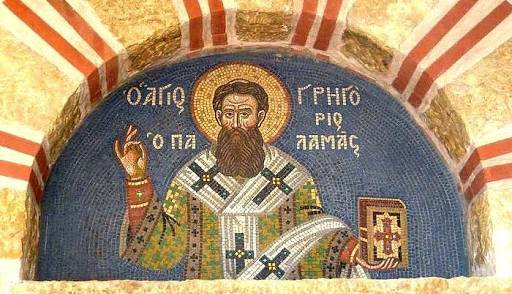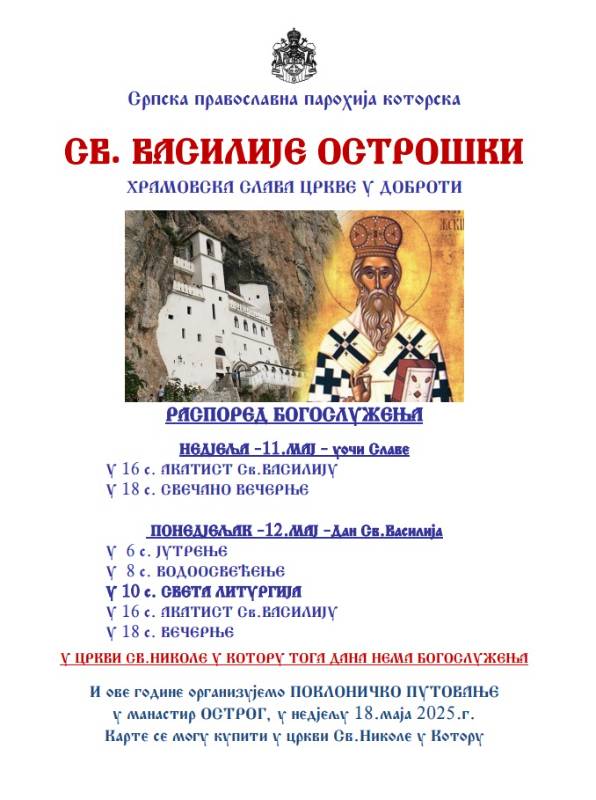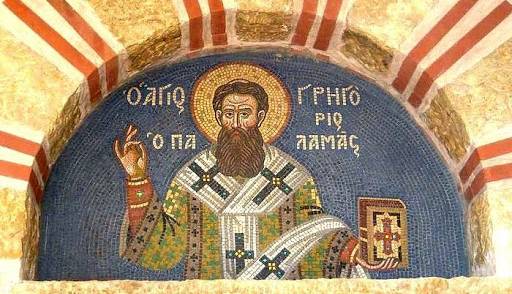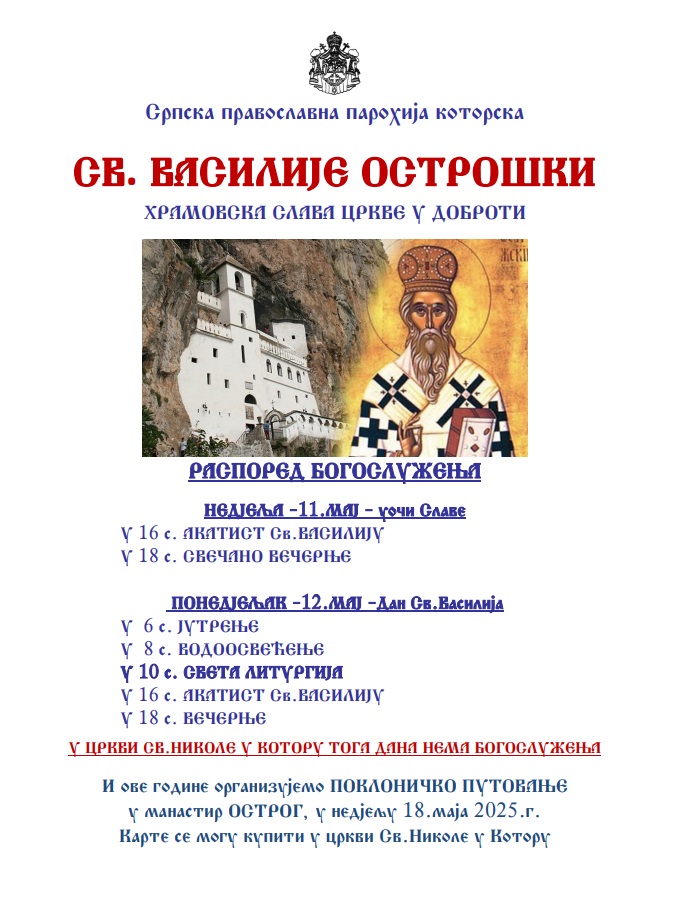
Saint Gregory Palamas: Sermon on fasting
1. It is pleasing to the eyes to behold the calm sea shining and shining with clear light, while its smooth surface reflects the flash of light. However, it is much more pleasant not only to see the Church, but also to speak in it, gathered in God, freed from confusion, mysteriously illuminated by the divine light and aiming towards that Shining with hands and eyes, and with all feelings and thoughts. Since the grace of the Spirit has given me today to see that beautiful sight, as well as you who are present day and night in the temple of God, making sure to approach it without any lack, I could compare you to the shoots of a supernatural tree, planted near the spring of the water of the Spirit. And I will, as much as I can, help that irrigation. Just as you add the daily prayers to the morning, so I, if time permits, will add the evening lesson to the morning, clearly pointing out to you the traps by which the enemy of our salvation tries in various ways to render useless not only fasting, but also our prayer.
2. There are, brothers, other types of bad overeating and drinking, but they do not come from eating and drinking, nor from the pleasures that come from them, but from anger at one's neighbor, from hatred and bad memory, as well as from every evil that they give birth, which Moses also speaks about in the song: Their wine is the dragon's poison and the incurable poison of the asp (Deut. Moses. 32; 33). That is why the prophet Isaiah says: Woe to those who are drunk without wine (Isa. 28; 1) and advises, saying: Do not fast while in a quarrel (Isa. 58; 4). To those who are fasting in such a state, he seems to be speaking in the name of the Lord: Do you call that fasting pleasing to God - when you bend your neck like a sickle? That is why I turn my eyes away from you when you spread your hands to Me, and when you multiply your prayers, I do not listen (Isa. 58; 5,1; 15).
3. Therefore, drunkenness of that kind, which springs from hatred and which, more than anything else, is the reason for God to turn away from us, the devil seeks to cause in those who pray and fast. He reminds them of other people's sins against them, encourages them to forget, and sharpens their tongues for slander. At the same time, he makes them resemble that man whom David describes as praying full of malice: You devise iniquity all day long, your tongue has devised injustice, like a sharp razor you have done deceit (Ps. 51; 3-4). David begs God to deliver him from such people, saying: Deliver me, Lord, from an evil man, and deliver me from an unjust husband... they sharpened their tongue like a snake, the poison of the asp is under their lips (Ps. 139; 1,3) .
4. I am asking you, brothers, that we, during the time of fasting and prayer, forgive from the bottom of our hearts if we once really had or thought we had something against someone and that we all abide in love. Besides, we think better of each other, encouraging each other to love and good works. Let us speak well of one another, and let us reason and think within ourselves about what is good before God and before men, so that we fast with a praiseworthy and blameless fast, and that the prayers we offer during the fast are pleasing to God, so that by grace we may praise Him in a fitting way. called Father and could boldly say to Him: Father, forgive us our debts as we also forgive our debtors (Mt. 6; 12).
5. There is, again, another inappropriate thing that the malefactor puts into our souls during fasting and prayer. It is a presumption, which that Pharisee also carried in himself: although he fasted and prayed, he returned (from prayer) without fruit (lit. empty). We, on the other hand, knowing that everyone who has a haughty heart is impure and that God does not accept him, and knowing that we are indebted to God in many and great things and that we repay only the smallest part of the debt, we will ignore what is behind us as completely null and we will strive for that that is before us, fasting and praying with a contrite heart, with self-reproach and humility, so that our fasting would be clean and pleasing to God, and that attention and vigilance would reign in the temple of God.
6. Another way of working of the cunning one, which makes our effort of fasting and prayer to be useless, consists in convincing us that we do it (that is, to fast and pray) out of love of glory and hypocrisy. That is why the Lord advises in the Gospel, saying: Enter your room and, closing your door, pray to your Father Who is in secret; and your Father who sees in secret will reward you publicly (Mt. 6:6).
7. He does not say this because he commands us to distance ourselves from gathering in the temple, from (common) prayer and psalm singing. In that case, the Psalmist - the prophet would not have said to Him: In the midst of the Church I will praise You (Ps. 21; 23), I will confess and praise You among the nations, Lord, I will sing psalms to You among the Gentiles (Ps. 56; 10) and I will fulfill my vows before those who They are afraid of Him (Ps. 21; 26), and to us: Churches bless God (Ps. 67; 27) and Walk, let us bow down and belong to Him and weep before the Lord our Creator (Ps. 94; 6). Time does not allow us to cite other, even more sublime examples. Therefore, the Lord teaches us to pray in solitude, in our homes, and even on our beds. encourages us to pray to God in the church as well, as a prayer that is created "from within", i.e. with the mind, encourages us to pray with the lips as well. The one who wants to pray only when he enters the temple of God, but does not care about prayer either at home, on the road, or in the squares, will not truly pray even when he is in the temple of God.
8. This is shown by the one who, after the words: My heart is ready, O Lord, adds: I will sing and sing psalms to Your glory (Ps. 56; 8) and in another place he says: If I would mention You on my bed, in in the mornings I would think about You (Ps. 63; 7). However, the following was also said: And when you fast, says Christ, do not be gloomy like the hypocrites; because they frown their faces to show themselves to people that they are fasting. I tell you the truth: they have received their wages. And you, when you fast, anoint your head, and wash your face, so that people do not see you where you fast, but your Father Who is in secret; and your Father, who sees in secret, will reward you publicly (Mt. 6; 16-18).
9. Oh, what incomparable philanthropy! With these words, the Lord has now announced to us the judgment and the decision that will be revealed at the future judgment, so that we may still receive a better judgment and a better share here. To those who live gloriously, and not according to His commandments, the Lord will speak words that agree with what He is saying now: "You have received your reward during your life", just as Abraham, according to the Gospel parable, said to the rich man in the fire: You have received his goods in his living (Lk. 16; 25). To those who strive in virtue with only Him in mind, He says that He will repay them publicly, i.e. that in front of that universal assembly (lit. scene) they will reciprocate with blessing, inheritance, joy and blameless and eternal enjoyment. He Who desires that all should be saved and come to the knowledge of the truth, does not desire that any should be deprived of this inheritance, for which reason, as I have said, He now declares His impartial and immutable judgment, showing that the sons of God are only those who have despised human fame.
10. That is why He speaks about this and about the other, saying: Your Father, Who sees in secret, will retaliate against you, in order to make those who despised empty and human glory His sons and joint heirs and to show them as such. The others, however, if they do not repent, will be deprived of adoption. The Lord says this so that our prayer and fasting would not be visible to human eyes, as a result of which there would be no benefit from them: it would happen that we bravely persevere in the effort of prayer and fasting, and we are deprived of the reward for it! He tells us to anoint our heads with oil and wash our faces, ie. that we don't try to be pale, dirty and dry-headed, as if we were tortured. fasting and as though we despised the body, for which we would receive praise from men. This is how the Pharisees acted due to their love of glory, which is why they were justly alienated from Christ's Church, and the Lord strictly forbids us to imitate them.
11. If someone sublimely says that the head of the soul is meant here, that is, the mind as its ruling part and that the face here denotes the imaginative part of the soul (imagination) in which there is a permanent center of those impressions (lit. actions) that originate from the senses , then it is good if, while fasting, we anoint the head with oil, i.e. if we make our mind merciful, and if we wash our face, i.e. his imagination, from shameful and impure thoughts, from anger and all cunning. Such a fast, which is perfected in such a way, not only expels and shames all bad passions and together with them the instigators and creators of these passions, i.e. demons, but also joins the fasting people with good angels and transforms them into angels, makes the angels their own guardians and arouses them (angels) to help them and to be their co-workers.
12. In ancient times, with those three young men in Babylon, decorated with the same abstinence and fasting, it was shown that there was a quarter with them in the fire, which preserved them unharmed and miraculously blessed them. In a similar way, an angel stood in front of Daniel, who was fasting for several days, giving him wisdom and predicting future events. On another occasion, when he (Daniel) closed the lions' mouths with prayer and fasting, an angel carried a prophet through the air from a great distance, who brought him food. In the same way, in us, who practice physical and spiritual fasting together and pray, with the help of good angels, the fire of carnal desires will be extinguished, anger will be tamed like those lions, and we will partake of prophetic food with hope for future goods, faith and mental contemplation , it will be given to us to tread on the serpent and the scorpion and all the power of the devil.
13. Fasting that is not such and that is not perfected in such a way is related to evil angels: their characteristic is starvation (lit. not taking food, Greek: agrshrš) associated with anger and hatred, with pride and opposition to God. That is why we will oppose them, since we are obedient and ministers of Good, because we do not war against flesh and blood, says the apostle, but against principalities, and powers, and the lords of the darkness of this world, against the spirits of malice in the heavenly places (Eph. 6; 12). We cannot oppose them exclusively with fasting, but for our protection we will also use the armor of righteousness, the helmet of saving alms, the shield of faith as well as the sword of the Spirit, the most powerful in defense, and that is the saving word of God addressed to us. In this way, we should fight a good battle, preserve a firm faith and quench the arrows of the cunning one and, having shown ourselves victorious in everything, obtain heavenly and unfading crowns, rejoicing together with the angels in Christ Himself our Lord.
14. To Him belongs all glory, power, honor and worship with the beginningless His Father and the all-holy, gentle and life-giving Spirit, now and always and to the ages of ages. Amen.
Taken from the book "Lord, enlighten my darkness", Belgrade 2005.
Source: Diocese of Zvornik-Tuzla
PHOTOS
RELATED ARTICLES

Calendar for May 9 His Homilist Basil of Amasia
Licinius, the son-in-law of Emperor Constantine, whose sister he had married,...

WORSHIPS ON THE OCCASION OF ST. VASILIJE OSTROŠKI
SERBIAN ORTHODOX PARISH OF KOTOR ANNOUNCES WORSHIPS ON THE OCCASION OF ST....

St. Mark's Day procession in Podgorica
On the occasion of the celebration of the city of Podgorica, the...





.png)